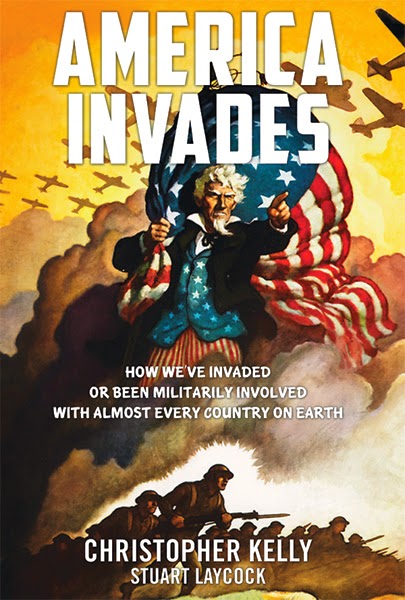 |
| Julia and Paul Child |
In August of 1945 two atomic bombs were dropped on Japan. Shortly afterward, Japan surrendered and VJ day was celebrated on 8/15/45.
In September of 1945, just weeks later, President Truman signed an executive order disbanding the OSS (Office of Strategic Services) which had gathered intelligence and fought behind enemy lines during the war. This action had the overwhelming support of the US Congress at the time.
The naivete of President Truman and most members of the US Congress in dissolving our worldwide intelligence apparatus is truly staggering. We'd won the war beating Germany and Japan; No more need for an American intelligence service! Those who write dark conspiratorial histories of America's grasping imperialist ambitions typically forget these chapters in our history.
Historians Isaacson and Thomas write in their history of the cold war The Wisemen, "Americans had grown weary of global responsibilities...and wanted nothing more than to "settle our difficulties with Russia and then go to the movies and drink Coke," according to Averell Harriman. Source: The Wise Men: Six Friends and the World They Made, Walter Isaacson & Evan Thomas, 1986, (www.amzn.com/1451683227). In late 1945, the veterans of the "greatest generation" wanted to return home and begin work on launching the baby boom without giving further thoughts to war and international politics.
One direct consequence of Truman's executive order was the dismissal from the OSS of Paul and Julia Child (8/15/12 marked the centennial of her birth, see earlier post, Happy Napoleon Day!, 8/15/12) who had met and fallen in love while serving in the OSS in Ceylon and in China. During the war, she even invented a recipe for shark repellent that was designed to save the lives of downed naval airmen--did it contain butter? After leaving the OSS, the couple returned to the United States and were married. Paul was re-assigned to work for the USIA (United States Information Agency) in Paris. Without Truman's dissolution of the OSS Julia Child might never have become a French-trained Cordon bleu chef, famous author or television personality.
Later in life Julia Child wrote a book (with Alex Prud'homme) called My Life in France (www.amzn.com/0307475018) which tells the story of her consuming love affairs with Paul Child, France and Cooking. The half of the movie Julia and Julie that was worthwhile was based loosely on this book--an anorexic cook who prepares a year's worth of Julia Child recipes -- I don't buy it! Reading My Life in France makes one hungry for classic French cuisine. I can relate to her exuberant joy in the pleasures of expat life.
Paul Child was a foot soldier in the cold war efforts who helped created presentation materials in Paris, Marseille, Bonn and Oslo. In her book My Life in France, Julia Child writes, "So icy was the Cold War now that Paul and I were half convinced that the Russians--"the wily commies," he called them--would invade Western Europe. He suffered nightmares over the possibility of an all out nuclear war. He grew snappish at the office, convinced that the busy world that ate up his days was trivial in light of our nation's unpreparedness. I declared that I was ready to man the barricades to defend la belle France ad her wonderful citizens." Julia later writes that Paul was preoccupied with "the fact that the U.S. wasn't doing enough to prepare Western Europe for a Russian invasion". In Paris, Paul did his best for the USIA creating, for example, presentations on the Berlin airlift that saved Germans from starvation in 1948 (see earlier post, http://americanconservativeinlondon.blogspot.com/2012/08/the-corporations-that-won-cold-war.html).
Julia and Paul Child were, undeniably, liberals for their time. She was a young woman who was in rebellion against her father -- a conservative Republican businessman from Pasadena. Julia tells us that Paul, "had to bite his tongue when my father's friends would casually scorn President Truman, Jews, Negroes, the United Nations, or all those "Phi Beta Kappas" in Washington".
Julia did not "like Ike" and she let her father know it. After the election of 1952 Julia had this exchange with her father...Julia "'Well, I guess you Pasadenans are pretty glad about Ike's election results.'
'Glad? I should say we are!' Big John thundered. 'Why who wouldn't be? Everybody's glad! But of course you people over there, you wouldn't know how the country feels--all your news is slanted.'
This was hard to take, especially from the man who read only the right-leaning LA Times. For the record, Paul and I were avid devourers of the New York Times, The Herald Tribune, Le Figaro, Time, Fortune, The Reporter, Harper's, The New Yorker, even L'Humanite, not to mention the flood of embassy cables, intelligence briefs, and other twenty-four-hour-wire-service and ticker sheets pouring in from around the world. So -- whose news was slanted?"
Commander Kelly must note here that Julia Child writes these words without even a trace of irony. The answer to her question is, of course, that BOTH father and daughter's news sources were slanted! They always are. Some, dear reader, have even accused Commander Kelly of being somewhat slanted!
When McCarthyism broke out in the US, Paul Child was summoned back to Washington and subjected to interrogation. Paul Child, the OSS spook, was suspected of being a treasonous commie spy in the state department. Julia Child was a committed New Dealer -- recall that the Democrats in 1952 had won 5 consecutive Presidential contests over twenty years. Accordingly, she did not "like Ike" and blamed him for complacency in the anti-communist withchunt.
She writes, "What was happening to America? Several of our friends and colleagues were tormented by McCarthy's terrible witch hunt. It ruined careers and, and in some cases, lives. Even president Eisenhower seemed unwilling to stand up to him, which made me angry. When Eisenhower announced that he'd run for a second term, after having a heart attack, I had no doubt that Adlai Stevenson would make the better (an more resilient) president. Ike was just not inspiring: I got nothing but a hollow feeling from his utterances, as if Pluto the dog were suddenly making human noises. Just about anyone from the GOP had, for me, a fake soap-selling ring to him, with the exception of Herbert Hoover, who had impressed everyone on a recent swing through Europe. Stevenson, on the other hand, had a nobility of ideals that appealed to me. I just liked eggheads, damnit!"
Julia Child might have been surprised to learn that Eisenhower in (see earlier post, Eisenhower in London, 7/23/12) loathed Senator Joseph McCarthy, in Stephen Ambrose's words "almost as much as he hated Hitler." Ike ordered all members of the executive branch to ignore McCarthy's summons with his Army committee hearings in the US senate. When Senator McCarthy went after the US Army he was taking on the American institution that was dearest to Ike's heart. Moreover, it was Ike who was, in fact, the principal architect of McCarthy's self-destruction in his showdown with the US Army. For a full account of how Ike broke McCarthy see Jean Edward Smith's "First off the Tee" chapter in his book--Eisenhower in War and Peace, 2012 (http:/www.amzn.com/140006693X).
 |
| Julia Child's Classic |
It was, of course, not principally in the field of political commentary that Julia Child made her mark on the world, but rather in the kitchen; here she excelled. The childless 6'2" Child poured out her passion into mastering French cooking and then explaining it effectively to the wide American public. She, along with her collaborators, wrote the classic Mastering the Art of French Cooking (www.amzn.com/0375413405) which was published in 1961 and made its way into countless American homes. She then went on to become the French Chef on public television.
Vice president Nixon and Nikita Krushchev fought their famous battle of the kitchen in Moscow in 1959 (http://www.nytimes.com/2009/07/24/opinion/24safire.html?_r=2). Previously, I credited General Electric with making many of the appliances that helped American women surpass their Soviet counterparts in the kitchen (see earlier post, The Corporations that Won the Cold War, 8/19/12), but that of course, is only part of the story. Corporations such as GE and Frigidaire may have supplied some of the "hardware," but it was Julia Child and others like her who created the essential "software" to advance the deplorable state of American cookery.
Julia Child's success meant that a surprise Soviet "borscht" first strike would be answered by the USA, not only with burgers and fries, but also with a devastating "boeuf bourguigon" reprisal!
Julia Child loved using butter and cream in her preparation of rich French sauces such as Bearnaise and Beurre Blanc. She adored pate and foie gras (see earlier post, Marijauna and Pate in California, 6/30/12). It is safe to say that "liberal" Julia Child would be horrified by the politically correct approach to food and nutrition espoused by today's liberal diet police (e.g. Michelle Obama). She made the world more delicious by her presence. She was a bridge across cultures and represented an America that would remain, not isolated, but rather, engaged positively with the world.
 |
| Commander K. flashes the "V for Victory" sign at Comrade Lenin in Fremont, WA |
Commander Kelly says, "Julia and Paul Child, therefore, each deserve credit in helping to guide the West to a most delectable victory over communism in the Cold War. Pass the butter!"
You can now purchase Commander Kelly's






































